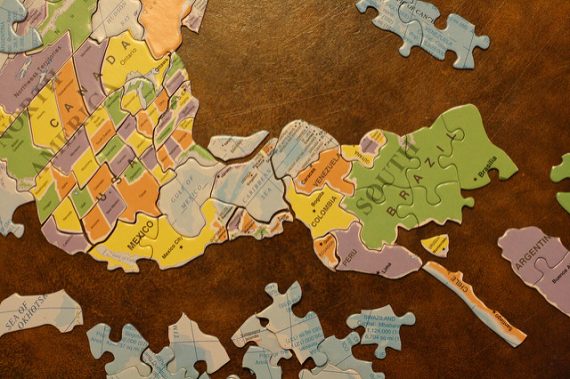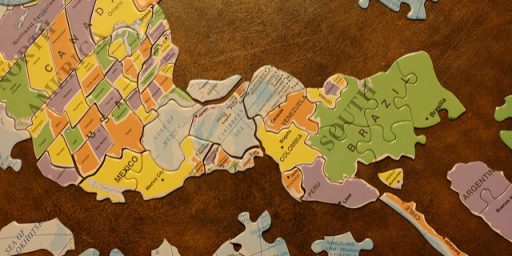Considering US Attitudes toward Latin America
Pondering lack of US interest in our friends to the south.

In my post on Covid-19 and Latin America Michael Reynolds asked:
I’m curious, @Steven, if you have an explanation for why Americans don’t care about South America. It’s never in the news except in reference to immigration. Americans (norte americanos) don’t visit much, evidenced by the lack of air service relative to Europe. A guilty conscience? A tendency to see anyone from south of the Rio Grande as a Mexican? It’s odd, given that north-south travel is easier on the system than flying across eight time zones.
I started to provide a slap-dash in comment response, but it is too big a question, so here is a partial response (it is the kind of question, like most good ones, that almost requires a book-length response).
I don’t know that I have a really good answer. I think it is a combination of colonialist/racist thinking, a sense that the region is not a high-level threat (but also being perceived as dangerous), and an ongoing situation in which prioritization leads it being down the list (from a policy/news POV).
It is worth noting that at least from a US government POV, there has often been a lot of attention paid to the region, much of it unwelcome. For example, there was a substantial amount of US intervention in the region, especially Central America and the Caribbean during from the very late 19th Century well into the 1930s (and after that as well) not to mention substantial interferences both due to the Cold War and the war on drugs.
But to return the question, I think the reality is most US citizens don’t care about the world in general, and we consume very little international news in general and tend not to travel abroad. To be fair, part of both of these issues is because we live in a continental country and therefore do not need to pay attention to neighbors the way Europeans do.
I think, too, there has long been an attitude that Latin America is dangerous and dirty, especially Mexicans, and that, really, Latin American is just one big Mexico from the Rio Grande to Tierra del Fuego. I know growing up in Texas and California both (in the 70s and 80s), there was this notion that going to Mexico was dangerous and if you went, you’d either be robbed or arrested by corrupt police. In more recent times the drug war in Mexico has been a deterrent to travel for some. And it is hard to not see a lot of immigration discussion as being cast in this light as well (such a Trump linking immigrants to disease).
The reality is, however, that there are a lot of awesome, amazing, and beautiful places in Latin America to visit, but folks in the US tend to think of Europe as the place to go abroad.
I think that the American public and the American government, have viewed Latin America as “ours” (such as the notion of the Caribbean as “that great American lake” or just the general feeling that it was all “our” backyard). That is certainly how we treated huge chunks of Central American and the Caribbean in the early part of the last century.

Latin America has often been a low priority place in terms of news and interest because it isn’t seen as a threat, but at the same time is seen as too dangerous a place to travel for some (some of my family thought I was nuts to live in Colombia in the mid-90s).
And while the US government has often expended substantial resources in the region, it has also never been a top priority. In broad brush strokes, though, the US government has often found itself looking elsewhere. World War II obviously has US eyes on Europe and Asia and then the Cold War moved the focus to Europe, but also Korea and Viet Nam. Of course, the Cold War then shaped the way US administrations approached the region as well, to include helping overthrow left-leaning governments in places like Guatemala in 1954, and support for right-wing authoritarians across the hemisphere.
The Cold War era is instructive insofar as US policy to the region was really more about fears of Soviet expansion than it was about Latin America, per se.
Even in the post-Cold War Ear, the attention shifted to the Middle East. Indeed, it is worth noting that George W. Bush was planning on making Latin America a priority and then 9/11 happened.
One would think that folks in the US would seek to forge a deeper connection to the region, given its proximity and the reality that we all have a lot in common, culturally. Instead, I think a lot of gringos look down the region and choose not to get to know it.
(This is, I admit, a partial response at best).






In the 80s and 90s I went to Mexico at least once a year sometimes twice. Not the touristy areas, mostly the mountains, sleeping on wide spots in the road, or in little villages, or as often as not somebody would offer their backyard or even their home. I can’t imagine driving into a small town in America, asking if there is someplace I can throw up a tent in broken English and having someone say, “Oh no, you must sleep in my home.” and yet that happened to me countless times in Mexico (speaking my pidgin Spanish). Usually I traveled with others but a couple times by myself. I won’t say I never had an unpleasant experience but I actually never got harassed by police like I have here. (I know others who have).
I had always planned on getting further south (Nicaragua, Colombia, Peru, the Pantanal, Patagonia, to name a few) but in 2001 I had to take custody of my sons and that put a big constraint on my traveling. The years have passed and my body rebels more and more. My “adventure traveling days” are pretty much behind me now and while I certainly could go to the more touristy areas, they don’t have much draw for me (tho I certainly wouldn’t mind seeing some Mayan and/or Aztec ruins).
These days I travel internationally by books. I am currently reading “The Cloud Forests” by Peter Matthiessen (written in ’61? it is just a weeeee bit racist, but as a chronicle of how things were then it is good). I also have “Incidents of Travel in Central America, Chiapas, and Yucatan” by John L Stephens taking up space on my shelf (someday I’ll actually read it) and going way back I have “The Incas” by Pedro de Cieza de Leon (I have read numerous chapters opened to at random, someday I’ll read it start to finish) (he was a Conquistador who wrote a “chronicle, which had been often republished throughout the 16th century, is not alone one of the most widely printed books on Peru’s conquest; it also — in this all scholars agree — possesses the greatest objectivity of any history ever written about the Incas.” This chronicle was so important to him that he sold his horse so he could buy more paper for it) There are others as well.
Sigh… so little time, so many books.
ETA: Steven if you have any suggestions for reading, I would certainly welcome them. While my interests trend towards the natural world and history I am by no means constrained to those subjects.
I think you’re overthinking it.
We don’t care much about Latin America because there’s very little going on there that affects us. Outside of Mexico, we really don’t have strong economic ties with any of the other countries (in a way that the average Joe cares about), none of them are driving international policies, and we don’t even follow the same sports.
Americans also don’t care about Lithuania, Norway, and Poland. Or, for that matter, any state (except California and Florida) that’s not nextdoor.
And I’d bet that people in Africa, Asia, and Northern Europe don’t care much about Latin America, either.
@Mu Yixiao: I would suggest you give a look at things like hemispheric trade before making comparisons to Lithuania and Norway.
@Mu Yixiao:
Also: do you really think that is a good metric?
For whatever it’s worth, I don’t think the average American gives a damn about Canada either.
@Steven L. Taylor: Also, I should have noted how much money we have spent in the region on the war on drugs (even in just Colombia alone). These are some really good reasons for people to pay a bit more attention.
@gVOR08: True.
@Steven L. Taylor:
The question was:
The remainder of the question talks about visiting countries (i.e., vacations). That’s referencing the “Average Joe”–not policy-makers. And, like it or not, the news caters to what the viewers want to hear–even the “unbiased news” has to select what will and will not get the time and effort put into it.
Whether or not it’s a “good” metric is beside the point. It’s the metric that’s being used.
@Mu Yixiao:
Well, actually, no. The question was about “Americans” and you chose to reduce it to “average Joe”–the problem with that is that the “average Joe” doesn’t care about anywhere else, including Europe (or, heck, about US politics and most people don’t even travel all that much within the US).
I’ve never been to Mexico, despite being a native Californian – though I should qualify that by saying that I’ve only spent about 10 years of my adult life in the state. I’ve never been to Central or South America. But I’ve gone to Europe more times than I can easily count, as well as ANZ and Japan. When I talk to my wife about going to Buenos Aires, for example, or Machu Picchu, it’s, ‘Nah, let’s go to China.” Eastern Europe, Vietnam, China, Antarctica, Israel, a return to Japan when it isn’t a July rice cooker, are all higher on my list.
It’s a blind spot, and I don’t quite understand it in myself, let alone in the broader sense. It’s different from the American indifference to Canada, which seems to most Americans like just more USA but with donuts.
One explanation might be that there are about a bazillion guided/packaged tours of Great Britain and/or Europe, and have been for ages, whereas I can’t recall seeing any such thing for South America or the various countries therein. (There probably are such things, but how often do you see them in comparison to ads for packages to, say, France and Italy?) Most people aren’t very adventurous, and feel safer if someone gives them a guide and a schedule. So…If it’s Tuesday, it must be Belgium. Right?
@Michael Reynolds:
You do not want to go to China right now. Ten years ago, I would have said “Yes. Go!” But the political climate there is no longer friendly to Americans (or Canadians). A couple months ago, the State Department put out an alert telling US visitors to expect “random detentions” and “extensive questioning”.
I’m quite glad I got out when I did.
@Mu Yixiao:
Our daughter is from Tongling, in Anhui province. I was cheated of going with my wife to pick her up as SARS had just hit and someone had to stay home with the first kid. I’m a little bitter about it. But I do try to avoid visiting totalitarian or fascistic states as I’d prefer adding my dollars to the economies of decent countries, but it’s not a hard and fast rule. (I’ve passed up opportunities to publish in China because I wasn’t willing to comply with their censorship demands.)
Once we rid ourselves of Trump I imagine Xi will look to make nice with the Biden administration, which will shift attitudes, perhaps enough for me to visit without being hassled.